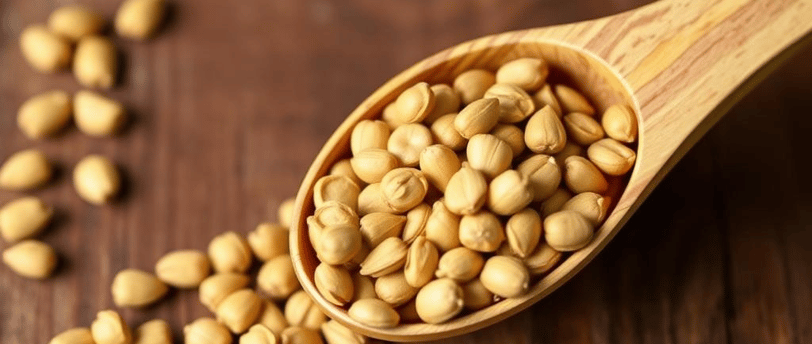Fenugreek Seeds: Your Gut's New Best Friend? Soothing Digestion & Promoting a Healthy Gut Microbiome
🥗DIGESTIVE HEALTH


For centuries, fenugreek seeds have been revered in traditional medicine for their diverse health benefits. While commonly known for their impact on lactation and blood sugar management, these little powerhouses are also emerging as a potent ally in soothing digestive issues and improving overall gut health. If you're struggling with bloating, indigestion, or are simply looking to nurture a healthier gut microbiome, fenugreek seeds might be just what you need.
What Makes Fenugreek Seeds So Gut-Friendly?
The magic of fenugreek seeds lies in their unique composition. Let's delve into the key components that contribute to their digestive prowess:
High Fiber Content: Fenugreek seeds are packed with both soluble and insoluble fiber. Soluble fiber attracts water, forming a gel-like substance that slows down digestion, promoting feelings of fullness and preventing constipation. Insoluble fiber, on the other hand, adds bulk to the stool, facilitating smoother bowel movements and preventing irregularity.
Mucilage Magic: Fenugreek seeds contain mucilage, a sticky substance that soothes and coats the digestive tract. This can be particularly helpful in alleviating symptoms of heartburn, acid reflux, and gastritis by creating a protective barrier against stomach acid.
Prebiotic Power: While not directly a probiotic, fenugreek seeds act as a prebiotic, providing nourishment for beneficial gut bacteria. A thriving gut microbiome is crucial for optimal digestion, nutrient absorption, and a strong immune system.
Anti-Inflammatory Properties: Chronic inflammation in the gut can lead to a cascade of digestive issues. Fenugreek seeds possess anti-inflammatory properties that can help soothe the digestive system and reduce inflammation.
How Can Fenugreek Seeds Help with Digestive Issues?
Here's a look at how fenugreek seeds can specifically address common digestive complaints:
Constipation Relief: The high fiber content in fenugreek seeds promotes regularity and eases constipation.
Soothing Heartburn and Acid Reflux: The mucilage in fenugreek seeds can help coat and protect the esophagus, reducing the burning sensation associated with heartburn and acid reflux.
Improving Digestion: By stimulating digestive enzymes, fenugreek seeds can improve the breakdown and absorption of nutrients, leading to more efficient digestion.
Reducing Bloating and Gas: A healthy gut microbiome contributes to efficient digestion and reduces the production of gas. Fenugreek seeds, as a prebiotic, can help foster a balanced gut microbiome, minimizing bloating and gas.
How to Incorporate Fenugreek Seeds into Your Diet:
There are several ways to enjoy the digestive benefits of fenugreek seeds:
Fenugreek Tea: Steep a teaspoon of fenugreek seeds in hot water for 10-15 minutes, then strain and drink.
Soaked Seeds: Soak a teaspoon of fenugreek seeds in water overnight. Consume the seeds and the water in the morning on an empty stomach.
Sprouting: Sprouting fenugreek seeds enhances their nutritional value and makes them easier to digest. Add sprouted seeds to salads, sandwiches, or smoothies.
Ground Fenugreek: Grind fenugreek seeds into a powder and add it to curries, soups, or stews.
Fenugreek Capsules: For a convenient option, consider taking fenugreek capsules as a dietary supplement.
Important Considerations:
Start Slowly: Begin with a small amount of fenugreek seeds and gradually increase the dosage to avoid digestive discomfort.
Hydration is Key: Drink plenty of water when consuming fenugreek seeds to help the fiber work effectively.
Potential Side Effects: Some individuals may experience mild side effects such as bloating, gas, or diarrhea. Discontinue use if you experience any adverse reactions.
Drug Interactions: Fenugreek seeds may interact with certain medications, such as blood thinners and diabetes medications. Consult with your doctor before taking fenugreek seeds, especially if you are taking any medications.
Pregnancy and Breastfeeding: While traditionally used to promote lactation, pregnant women should avoid fenugreek seeds as they may stimulate uterine contractions.
The Bottom Line:
Fenugreek seeds offer a natural and potentially effective way to soothe digestive issues and promote a healthy gut. By incorporating these tiny seeds into your diet, you can harness their fiber-rich, mucilage-laden, and prebiotic properties to support a happy and healthy gut. Remember to start slowly, stay hydrated, and consult with your doctor if you have any concerns. Your gut will thank you!
